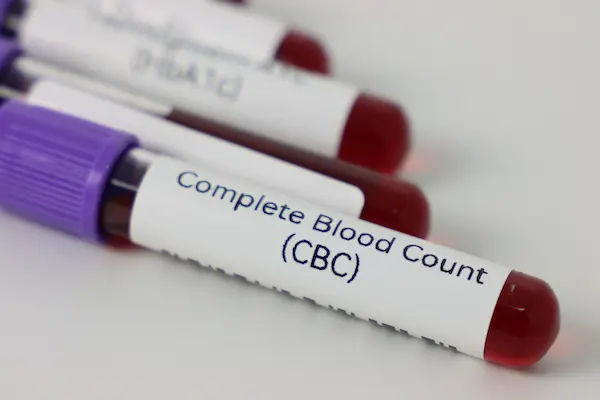Persistent Fever in Children: How an ESR Test Can Help Find the Cause

Written by Dr. J T Hema Pratima
Reviewed by Dr. D Bhanu Prakash MBBS, AFIH, Advanced certificate in critical care medicine, Fellowship in critical care medicine
Last updated on 8th Aug, 2025

When a child experiences a fever that doesn’t seem to go away, it can be extremely stressful for parents. While short-term fevers are usually due to common viral infections and resolve within a few days, persistent or recurring fevers lasting longer than a week can signal an underlying issue. In such cases, doctors may recommend certain blood tests to uncover the root cause.
One of the most useful tests in this scenario is the ESR test. The ESR test for kids, short for Erythrocyte Sedimentation Rate, is a simple blood test that helps detect inflammation in the body. Though it doesn’t pinpoint the exact illness, it plays a vital role in helping doctors narrow down the possible causes of prolonged or unexplained fever. If your child has had a fever lasting more than 8 days, or if the fever continues despite treatment or comes with warning signs, an ESR test may be one of the first steps doctors take to look for inflammation.
In this article, we’ll explore why your child might need an ESR test, what the test involves, what the results mean, and how Apollo 24|7 makes it easy for concerned parents to book a persistent fever test panel online.
Understanding ESR and Why It Matters
ESR (Erythrocyte Sedimentation Rate) is a blood test that measures how quickly red blood cells settle at the bottom of a test tube. Normally, they settle slowly, but when there is inflammation in the body, due to infection, autoimmune disorders, or chronic illness—they clump together and fall more rapidly. For children with persistent fever, this test offers an important clue. A raised ESR level indicates that something in the body is triggering an inflammatory response. It does not confirm a specific disease, but it alerts doctors to look deeper.
Why Use ESR in Children?
- Children often present with non-specific symptoms, especially in the early stages of illness.
- ESR is useful in detecting chronic infections, autoimmune conditions, or hidden inflammations.
- It helps doctors decide whether further tests (like CRP, WBC count, or imaging) are needed.
- It's a safe, low-risk test that only requires a small blood sample.
When to Worry About a Persistent Fever?
It is natural for children to fall ill often, especially those between 3 to 10 years, due to developing immunity and regular exposure at school or daycare. Most fevers are harmless and self-limiting. However, parents should be concerned if:
- Fever lasts more than 7–10 days without clear cause.
- It keeps returning after short gaps, even with medication.
- The child looks unusually tired, is losing weight, or has joint pain or swelling.
- Other signs like rashes, night sweats, or enlarged glands are present.
- In such cases, a persistent fever test panel, including ESR, can be a valuable first step.
Conditions an ESR Test Can Help Detect
While ESR is not disease-specific, it helps guide doctors toward identifying the root cause of the fever. Some conditions in children where ESR levels are often elevated include:
1. Chronic Infections
- Tuberculosis (TB): A common cause of prolonged fever in India.
- Urinary tract infections (UTIs): Especially in younger children.
- Respiratory infections: Sinusitis or pneumonia that doesn’t respond to initial treatment.
2. Autoimmune Disorders
- Juvenile idiopathic arthritis (JIA): ESR helps monitor disease activity.
- Systemic lupus erythematosus (SLE): A condition that causes chronic inflammation.
- Vasculitis: Inflammation of blood vessels, sometimes seen in Kawasaki disease.
3. Post-viral Inflammation
Sometimes, after common viral infections, the body may develop a lingering inflammatory response.
4. Cancers (Rarely)
Conditions like leukaemia or lymphoma may present as persistent fever with high ESR, though this is rare and usually accompanied by other red flags.
What Does the ESR Test Involve?
The ESR test for kids is simple and quick. Here's what parents need to know:
1. How is the Test Done?
- A healthcare professional takes a small blood sample from a vein in your child’s arm (or via finger prick in very young children).
- The sample is sent to a lab, where the rate at which red blood cells settle in a test tube over an hour is measured.
- Results are usually available within 24–48 hours.
2. How to Prepare?
- No fasting is needed for ESR.
- Inform the doctor if your child is on medications, especially anti-inflammatories or antibiotics, as these can affect the reading.
3. Is It Painful?
The blood draw causes minimal discomfort, similar to a mosquito bite. It is over in a few seconds, and children can return to normal activities immediately afterward.
Understanding the Results
Here’s what the results of ESR mean:
1. Normal ESR Values in Children
- ESR values differ slightly by age and sex, but generally for children: 0 to 10 mm/hr is considered normal.
- A mildly raised ESR may not always be alarming—it could be due to a recent cold or minor infection.
- A significantly high ESR (e.g., >40 mm/hr) indicates a stronger inflammatory process.
2. What Do High ESR Levels Suggest?
- Moderate Elevation (20–40 mm/hr): Could suggest a lingering infection or mild inflammation.
- Marked Elevation (>40 mm/hr): May indicate a more serious or chronic condition needing further evaluation.
Note: Doctors never rely on ESR alone, they interpret it along with the child’s symptoms, history, physical examination, and sometimes, additional tests like CRP, CBC, or imaging.
Schedule an Assessment and Get Your Health Checked
When is ESR Typically Ordered?
Your child’s doctor may recommend an ESR test if:
- The fever is unexplained and ongoing for more than a week.
- There are joint pains, rashes, or complaints of fatigue.
- Other infections have been ruled out but symptoms persist.
- They need to monitor the response to treatment in an already diagnosed illness.
What Comes After the ESR Test?
If the ESR level is raised, the doctor might:
- Order more specific tests, such as:
- CRP (C-reactive protein)
- Complete blood count (CBC)
Urine routine
Urine culture
Chest X-ray or abdominal ultrasound
- Begin empirical treatment, especially if a bacterial infection is suspected.
- Refer to a specialist (like a paediatric rheumatologist or infectious disease expert) if needed.
- The ESR test serves as a starting point, not a conclusion. It helps your child’s doctor take a more informed, data-driven approach to solving the cause of a fever that won’t go away.
Book an ESR Test for Your Child on Apollo 24|7
Apollo 24|7 offers convenient at-home sample collection and quick reporting for essential diagnostic tests. If your child has been struggling with prolonged or unexplained fever, book an ESR test or full persistent fever test package today.
Here are the top relevant options available on Apollo 24|7:
- ESR (Erythrocyte Sedimentation Rate) Test: A quick test to detect inflammation and monitor infections in children.
- Haemogram Test: Includes ESR and CBC – ideal for evaluating persistent or recurring fevers.
- Apollo Fever Panel - Advance: A more detailed package covering infections like dengue, typhoid, and malaria, along with inflammatory markers.
Schedule an Apollo Fever Panel - Advance
- CRP (C-Reactive Protein) Test: Often done alongside ESR to get a clearer view of inflammation severity.
Apollo’s certified labs and home sample collection services make testing safe, child-friendly, and accurate. You will receive timely reports and follow-up support from qualified doctors, all in one platform.
Conclusion
A fever that refuses to go away is your child’s body trying to tell you something. While it may turn out to be a minor issue, it’s always better to investigate early and thoroughly. The ESR test for kids is a safe and effective tool that can guide doctors toward identifying underlying infections, immune problems, or inflammation that needs attention. Whether your child has recurrent fevers or vague symptoms like tiredness, joint aches, or appetite loss, getting an ESR test through Apollo 24|7 is a smart and proactive choice. Combined with expert consultation, it can bring peace of mind and timely care. Book your ESR or fever test today and take the first step toward your child’s wellness. With early diagnosis comes better treatment and faster recovery.






